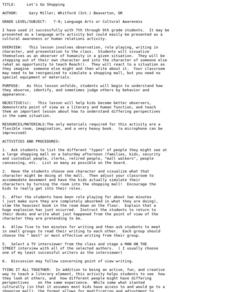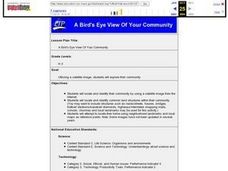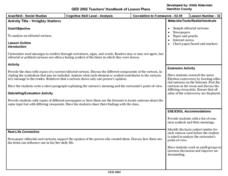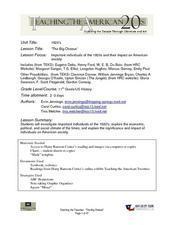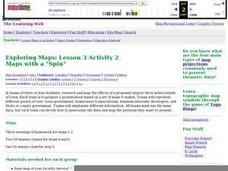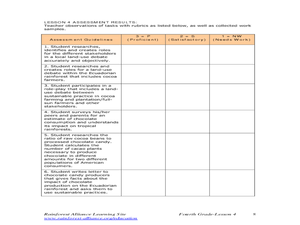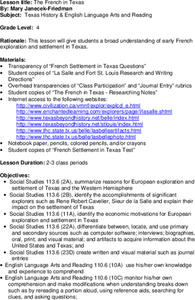Curated OER
Creating an Oral History--Who Tells the Story?
Explore the difficulties in compiling an oral history with this lesson. Young researchers conduct interviews and consider how point of view changes various accounts of a single incidence, resulting in conflicting information. They view a...
Curated OER
Preserving Our Barns
Students examine the different points of view when it comes to preserving barns. Using the internet, they work together to identify the risk involved in renovations and a barn in their local town that needs to be renovated. They create...
Curated OER
Let's Go Shopping
Students explore how to become better observers, demonstrate point of view as a literary and human function, and learn an important instructional activity about how to explain differing perspectives in the same situation.
Curated OER
A Right to Bear Arms - One Patriot's View
Students research Samuel Adams' role in the crafting of the Second Amendment. They consider how Adams' views evolved with time and write a one-page response linking their research to current events.
Curated OER
Cartoons in the Classroom: Economic Blame Game
Two political cartoons grace this critical analysis activity. Several very good discussion questions and points to consider, could make this an interesting start to any US Government class. Prepare upper graders for identifying...
Central Bucks School District
Making Generalizations
Being able to recognize patterns, craft generalizations, and draw conclusions based on information in a text passage are essential critical thinking skills. Encourage learners to hone these skills with a worksheet that asks them to read...
Curated OER
A Bird's Eye View Of Your Community
Young scholars locate and identify their community by using a satellite image from the Internet. Students locate and identify common land structures within their community. You may want to include structures such as roads/streets, houses...
Eastconn
Learning to Analyze Political Cartoons with Lincoln as a Case Study
Discover the five main elements political cartoonists use—symbolism, captioning and labels, analogy, irony, and exaggeration—to convey their point of view.
Curated OER
Stamp Act: Virtual Representation vs. Actual Representation
Eleventh graders research and discuss the different points of view of colonists in terms of taxation, as well as how these viewpoints helped lead to the revolution.
Curated OER
The Importance of Being Flexible and Open-minded as a Visitor to Another Culture: Lesson 2 For "The Train Ride Home"
Young scholars examine the advantages of being flexible when visiting or living in a different culture. They read and discuss a first-hand account by a Peace Corps volunteer in Kazakhstan, and write a letter from the point of view of a...
Curated OER
Lesson 1: The Image of Maine in Sinclair Lewis' Babbitt
Students study excerpts from Sinclair Lewis, "Babbitt" for its accuracy and socio-economic point of view. They rewrite a portion of "Babbit" using the point of view of a Maine guide.
Curated OER
Weighty Matters
Learners analyze political cartoons, and write short paragraphs explaining the cartoon's meaning and the cartoonist's point-of-view.
Curated OER
"The Big Cheese"
Eleventh graders research and examine the significant individuals of the 1920s and their impact on American society. They identify characteristics of people who make a difference, and in pairs conduct research on two people with...
Curated OER
Cross-Cultural Dialogue Lesson
Students view situations from more than their own point of view. They use the incidents in the author's story to explore the concept of crossing cultures and reflect on what it is like to feel like an outsider (in the way that the author...
Curated OER
Westward Expansion
Learners explore the Westward Expansion Movement of U.S. history. For this Westward movement lesson, students use primary and secondary source documents research personal accounts of those who travelled west during the era....
Curated OER
Day in the Life of a Homeless Person
Students examine a day from the point of view of a homeless person. They listen to and discuss two stories, identify ways to help homeless people, watch a Reading Rainbow video, and write an essay.
Curated OER
Maps with a "Spin"
Students, in groups, research and map the effects of a proposed airport three miles outside of town. They prepare a presentation based on a set of maps they make and explains its different points of view from the viewpoints of the town...
University of Virginia
Analyzing Social Commentary in The Adventures of Huckleberry Finn
The Adventures of Huckleberry Finn continues to be one of the most frequently banned books. The satire and social commentary present challenges when using the book as a core text. Direct readers' attention to how Twain uses plot,...
Scholastic
The First Thanksgiving Feast for Grades 6–8
It's time for the feast! Young historians complete their study of the First Thanksgiving by completing an online activity, watching a slideshow, and examining a First Thanksgiving timeline. After answering text-dependent questions to...
Curated OER
How can we keep our forests intact and have chocolate too?
Fourth graders recognize the need to sustain crops in the rainforest. For this rainforest lesson, 4th graders consider the use of products from the rainforest. Students discuss how people of different points of view decide what to do...
Curated OER
Northern and Southern Differences in 1856
Fourth graders investigate differences between the ideology of the Northern and Southern states in 1856. For this states' history lesson, 4th graders examine the needs for slaves in the Southern agricultural economy, and compare it to...
Curated OER
The French in Texas
Fourth graders use Internet to examine early French exploration and settlement in Texas, and write journal entries from point of view of 17th Century French settler, French or Spanish explorer, or Native American whose land was taken.
Personal Genetics Education Project
DNA, Crime and Law Enforcement
Civil rights meets biotechnology in a instructional activity that scrutinizes the collection of DNA of citizens who have been arrested, but not yet convicted of a crime. Real-life cases are examined in which the DNA of a relative was...
National Endowment for the Humanities
A “New English” in Chinua Achebe’s “Things Fall Apart”: A Common Core Exemplar
To examine the “New English” Chinua Achebe uses in Things Fall Apart, readers complete a series of worksheets that ask them to examine similes, proverbs, and African folktales contained in the novel. Individuals explain the meaning...




